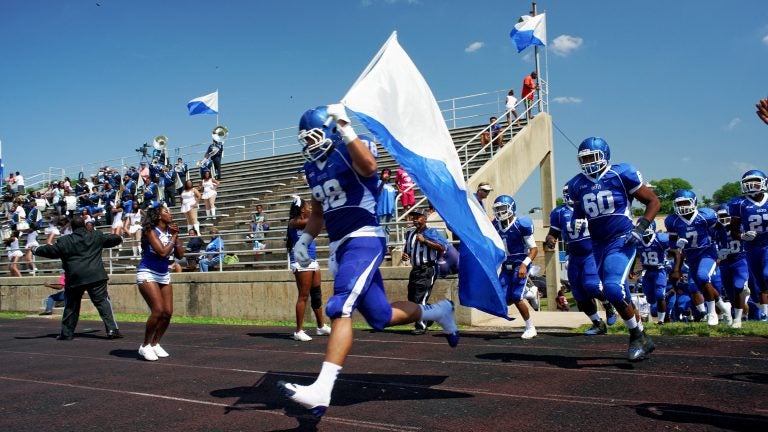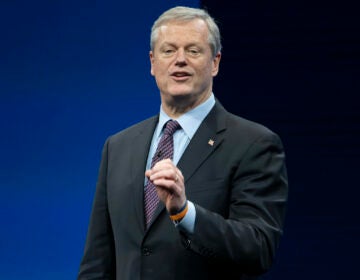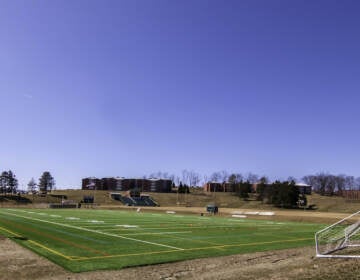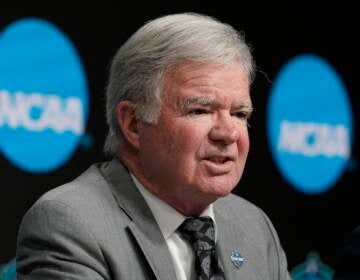Money woes force Cheyney University to suspend most athletic programs
Once known for its basketball teams, Cheyney is restructuring its athletic department to help the nation’s oldest historically black college become financially stable.

In this 2015 photo, Senior Christian Sanchez carries the flag for the Cheyney University football team (Bastiaan Slabbers for WHYY)
Cheyney University — once known for its dominant basketball teams — is now restructuring its athletic department to help the nation’s oldest historically black college become more financially stable.
In June, the university will withdraw from the Pennsylvania State Athletic Conference (PSAC), drop its NCAA Division II status, and suspend most of its athletic programs.
The men’s and women’s basketball, as well as the women’s volleyball programs will be independent next year, while seeking to join a new athletic conference.
PSAC commissioner Steve Murray said he’s not shocked — he has been in discussions with president Aaron Walton since August — but he is saddened by the university’s decision.
“They are a charter member,” he said. “Historically, they have a great history with us, particularly the sports of basketball from the 70s. They’re the only men’s basketball teams ever to win a national championship for our league, so it is sad.”
Murray said Cheyney — which has struggled with low enrollment and the highest debt levels in the school’s history— is not the only institution scaling back its sports programs for financial reasons.
“It’s a reality that conferences around the country have faced as well,” he said. “The same day that Cheyney announced, Eastern Michigan, which is a fairly large institution, announced they were dropping four sports because of their funding availability, so it’s a very difficult time.
“I think the paradigm is shifting relative to higher education funding.”
‘Mad that it’s happening’
Cheyney’s suspended its football program in December.
“I was kind of shocked because it was such late notice towards the end of the semester,” said sophomore Brandon Joyner, 20, who came to the university for its Keystone Honors Academy and to play on the gridiron.
“There’s a lot of students that play football and a lot of them didn’t get to touch the field,” he said. “And this is one of their only opportunities, so I think it was unfair for all the kids and student athletes on the football team. They didn’t let the coaches know, even though they came back second semester, and they couldn’t get in their office.”
The Fairbanks, Alaska native says he is considering transferring to Elizabeth City State University, a historically black college in North Carolina where he can continue to play football and be closer to his family’s new home.
Junior Isaiah Galloway, 20, who runs track and field, said the move has upset students who were already coping with the university coming close to losing its accreditation last year.
“People here are definitely mad that it’s happening. They’re not hiding it. They show it everyday,” he said. “It makes the attitude of the students here not bond with each other. We should bond or get along. The attitude, that’s a major factor in it. It’s just changing all around.”
Galloway said track athletes are scrambling and wish the school had told them before their season started.
Cheyney had nearly 150 student athletes in the fall and will have approximately 35 student athletes next fall.
Galloway also plans to transfer to another historically black college, and wonders how the changes to Cheyney’s sports programs will affect social life on campus, which straddles Chester and Delaware Counties.
“The other students, they’re not going to have no fun,” Galloway said. “Homecoming, Battle of the Firsts — we don’t get no more of that no more. The campus environment is definitely going to be, ‘What are we going to do on a Saturday at 1 o’clock or on a Thursday when the volleyball team plays?’ Who wants to watch volleyball every Thursday? We want to see football and the band.”
Galloway said Cheyney didn’t have a band this year.
‘A necessary evil’
“Clearly you want to have everything that you could have at a college or university, but drastic times call for drastic measures,” said alumnus Michael Coard, who was a freshman when Cheyney won the 1978 NCAA Division II men’s basketball championship.
Coard, an attorney and co-founder of Heeding Cheyney’s Call, a group dedicated to supporting the university during these tough times, was initially opposed to the idea of a hiatus — one he hopes won’t last more than three to five years.
“Obviously academics are the priority,” he said. “So at this point, I’ve come to the conclusion that it was a necessary evil, albeit hopefully, a temporary evil.”
To be a member of NCAA Division II or Division III, a school must have 10 athletic programs, according to PSAC commissioner Murray. Once Cheyney froze its football program, it only had nine.
NCAA Division II also has sports scholarship requirements. Cheyney was already on probation with the NCAA for not sponsoring the minimum sports scholarships for women’s indoor track and field, Murray said.
He is encouraging the university to consider joining the United States Collegiate Athletic Association, which has more than 80 schools along the East Coast, including many of the Penn State University satellite campuses, and has a lower level of sports sponsorship requirements.
Coard has helped coordinate events around the 40th anniversary of the university’s basketball championship.
Cheyney played University of Wisconsin-Green Bay in the title game. Legendary coach John Chaney led the team from 1972-1982 at what was then called Cheyney State University.
“I’m hoping that if folks realize what we did as long as forty years ago that we can start building upon that because that 1978 championship was a great recruitment tool. I’m hoping that we can build upon that,” Coard said. “Clearly sports, especially successful and championship sports, does help with recruitment. And more anything else, Cheyney needs money and students.”
Both the men’s and women’s basketball teams are storied programs. The women’s team, led by Hall of Fame coach Vivian Stringer from 1971-1983, was the 1982 NCAA Division I national runner-up.
Without sports teams, it’s harder to recruit students Coard said, but Cheyney is out of options.
University President Walton said the changes are essential for the financial health of the university, which still wants to provide student athletes with opportunities.
“These are extremely difficult but necessary decisions that are being made on behalf of our entire student population, and to help ensure the university’s future,” Walton said in a statement. “They will remain in effect until we achieve our financial objectives.”
—
Correction: Due to an editing error, the original version of this story misidentified the title of Cheyney University president Aaron Walton.
WHYY is your source for fact-based, in-depth journalism and information. As a nonprofit organization, we rely on financial support from readers like you. Please give today.




